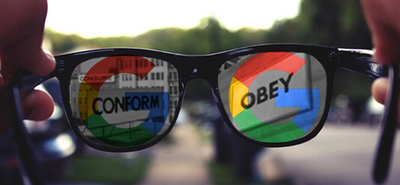Published Sep 30, 2019 by Xiph
Today, the greatest and most effective salesman is not the magazine, the billboard, the television or even the internet. It’s your own mind.

Today, the greatest and most effective salesman is not the magazine, the billboard, the television or even the internet. It’s your own mind.
De-googling and retaking control
In 2015, when Google became Alphabet, they updated their slogan from the now-ironic “Don’t be evil” to the tamer but just-as-ironic “Do the right thing”. For a company whose opaque practices allegedly include:
- the rampant censoring of speech
- the demonetisation of channels with conflicting viewpoints
- (illegally) acquiring personal records for multiple untoward purposes
- gleefully collaborating with the manufacturers of military technology…
…then this most recent slogan is as laughable as it is disturbing.
The short, straight road to de-googling
Close your eyes and you’ll see foosball tables full of Silicon Valley soldiers-of-truthiness relaxing into the fact that the overwhelming majority of Google users either pay no mind to anything beneath the interface, or shrug off any rumours of any suggestion of improper conduct with the ol’ “it doesn’t affect me.” And of course, let us not forget that for most, ease-of-access trumps all else and fair enough. When you’re running late and tasked with getting the kids off to school and arriving at work on time, the fact that Google and the gang are up to no good isn’t going to stop you from shouting into your Google Home for the morning’s traffic conditions.
But the fact of the matter is that Google and the gang are up to no good (‘the gang’ being other corporations and conglomerates with all ten fingers in our virtual pies). Telstra recently reported that roughly 100 non-law enforcement organisations have placed a permanent chock in a legislative loophole so as to access oceans of metadata for a range of different (and unknown) uses. As it stands, only agencies and bodies listed in Section 110A of the Telecommunication Interception Act should be able to access our metadata, yet these other 100-plus faceless organisations are making use of the separate Telecommunications Act to skirt restrictions and unofficially add themselves to the list.
If you’re asking – how does the nefarious accessing of metadata impact my life? At present, it may not, but let us consider the connotations.
Your department is close to finalising some game-changing IP or, as a result of due diligence, your sales team is playing its cards close to its collective chest to drive home a commercial advantage – how safe is that info really? Some won’t care because that’s company business; my private life remains unaffected. Does it? Alright, let’s make it personal.
Imagine your former spouse looking for dirt that could be blown out of proportion for custody and court proceedings, or your boss acting on a hunch that your browsing or chatting habits don’t align with the company’s best interests. Sure, you’re probably not doing anything in the same city, let alone the same ballpark as illegal – but can you say for sure that you won’t at some point be dragged into civil court proceedings for unjustified reasons?
Like it or not, you are now more of a commodity than ever. The details of every site you visit, message you send, file you download, newsletter you subscribe to – are ripe for theft and manipulation. Your innermost desires and curiosities are being harvested and fed back to you in a multitude of ways. Your worries and paranoias are being cultivated and reinforced. All in the name of deflating your bank account (maybe) and beefing up theirs (definitely). In 2019, the greatest and most effective salesman is not the magazine, the billboard, the television or even the internet. It’s your own mind.
This is one of many reasons why the concept of de-googling your tech is gaining traction.
Demystifying De-googling
In simple metaphoric terms, de-googling is taking your online practices and data and placing it all in a room then shutting, locking, triple-bolting and installing motion sensors around the door so that Google (and the gang) can’t get anywhere near it. This can be done through both intelligent software and hardware decisions.
In tangible terms, de-googling can be achieved to varying degrees. It could be as simple as reducing your Google footprint by changing search engines over to DuckDuckGo. But for those who truly want to leave the radius of Google’s reach, you’ll be pleased to know that a range of exciting, comprehensive, privacy-first technologies have entered (and are about to enter) the market and are only set to increase in popularity.
For example: the Librem 5 smartphone by Purism, set to roll out over the second-half of 2019, is the first completely de-googled device on the planet. Built from the ground up with complete autonomy in mind, the high-quality, feature-packed, linux-based phone takes every single privacy and security issue that comes with using market-standard devices and resolves them, convincingly. It runs on Pure OS – a fully-auditable, Android and iOS-free operating system that houses a growing list of similarly encrypted applications such as PureBrowser.
Then there’s /e/ – an entire mobile ecosystem that cuts Google out of the picture and offers a comprehensive set of open source applications that put privacy and security first. Not to mention Sovereign OS – a government and corporation-proof operating system that actually allows Google apps to continue running on your Pixel smartphone while eliminating the possibility of your data being harvested and used for unknown purposes. These are just three of the growing number of Google-free alternatives that you can take advantage of today.
Turning to technologies such as these that respect the sanctity of your digital life is a new and therefore underreported concept. As more and more individuals begin to adopt this privacy-first ethos, features will accumulate, options will widen and prices will drop. Those of us that are leading the pack and resetting the standards of what to expect from our digital devices are acting in the best interests of future generations. They are David fronting up to Goliath’s door and confidently stating as a matter of fact: we know what’s best for us and we don’t need to surrender our souls to you in order to get it.
The world is already unsafe enough. De-googling makes it that much safer.
Posted in: Security


